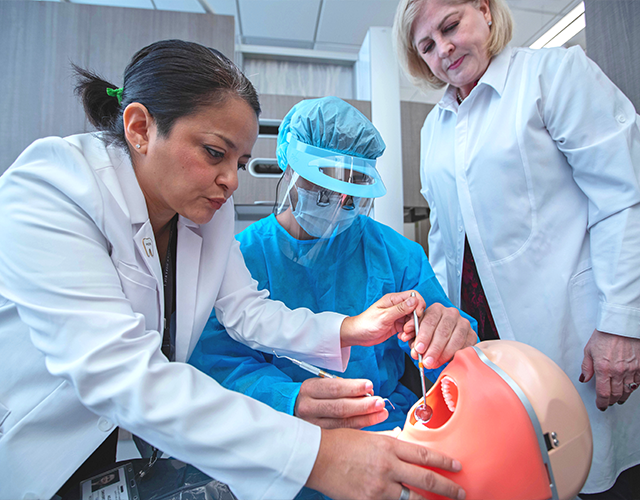Spotlight Series: Anthony Alvarado
April 30, 2020
After spending years working in the industry and earning his master’s degree, Anthony Alvarado, an energy technology instructor at Palo Alto College, had the opportunity to return to his alma mater to share his expertise in the field.
Alvarado comes from a family with a long line of military service. His parents both served in the military as well as a few uncles and great uncles, serving as far back as World War II.
“We didn’t have the opportunities that there are now,” said Alvarado. “You either went to college on a scholarship, or you followed in your parents’ footsteps. My whole family went into the military.”
Alvarado put his mechanical inclination to use in the U.S. Navy, serving as a steam propulsion engineer in a 1200 PSI power plant on a naval ship.
After his military service ended, Alvarado joined civil service and briefly worked at Kelly Field. He later directed operations for more than 20 oil rigs for J. Ray McDermott. His work took him as far as the Bay of Campeche and Venezuela.
However, following a few injuries on the job, his doctor advised that he should find an office job, so he decided to go back to school to get his degree. Alvarado earned two Associate of Arts degrees and three Associate of Science degrees from Palo Alto College, and he attended Texas A&M University-Kingsville to earn a Bachelor of Science in Mechanical Engineering and Master of Science in Civil Engineering.
“I did things backward. I had time and life experience, and then I went on to receive my degrees,” said Alvarado. However, his students benefit from his "backward" approach because he teaches from the perspective of real-world scenarios. “I’m more down to earth with them because I’ve worked in the field before and then continued my education.”
With his wide range of experience and multiple degrees, Alvarado is also qualified to teach courses in the industrial technology and engineering programs. For Alvarado, becoming a professor at Palo Alto College is the fulfillment of a promise he made to give back to his community.
“I was going through some personal challenges due to Operation Desert Shield and Desert Storm. I almost didn’t stay in college,” said Alvarado. “This school [Palo Alto College] saved my life because I was spiraling – going through some really dark places in my life. I made a promise to several people here that if I graduated with a masters, then I would come back and teach.”
In the classroom, Alvarado teaches his students to develop a safety-first mindset early on to prevent injuries and accidents. Students start every class with a safety brief as they would out on the field.
“Whether it’s industrial technology, manufacturing, or energy, you have to follow procedures,” said Alvarado. “When I was offshore, every morning as a lead man, I had to give a safety brief. I’d always tell my people. Look up, look down, look left, look right. Constantly be looking around because anything and everything out here will kill you.”
Students also learn how to make their own nuts and bolts as they would if they were working offshore, along with making homemade gaskets out of raw material.
“Workers could be on a ship or an oil rig offshore, and [sometimes] they don’t have access to products,” said Alvarado. “They can’t just run to the store, so a lot of stuff has to be manufactured on the spot.”
A phrase often repeated in the classroom is, “A pump is a pump is a pump.” He wants students to realize that process manufacturing can be applied to a variety of products, from the oil and gas industry to the production of soft drinks.
Alvarado has taught students ranging from high school to 60 years of age, and he is always working to make learning relevant to students and ensure courses are keeping up with the modern industry.
“I understand the students, so I try to find ways to get them interested,” Alvarado said. “There are people out there who aren’t good with books and computers, and stuff like that, but they’re great when it comes to hands-on or vice versa.”
The energy technology program offers students the option to enroll in the fast track certification program and/or earn an Associate of Applied Science. The program is designed to accommodate the need for multi-skilled workers with foundations in electronics, hydraulics, mechanics, and other necessary skills to begin a career in the energy industry.
To learn more energy technology and other Advanced Manufacturing, Technology, Engineering, and Logistics (AMTEL) programs available, visit zqosn.net/pac/pte.



